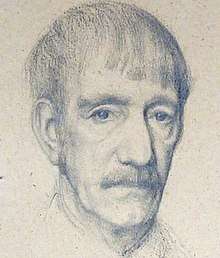Tommy Potts
Tommy Potts (1912–1988) was an Irish fiddle player and composer from Dublin who gained iconic status in traditional Irish music circles for his virtuoso musicianship. His music has influences from jazz and classical music, making it a highly individualistic take on the Irish music tradition. Only one commercial recording of his playing was ever made.
Tommy Potts | |
|---|---|
 Portrait drawing of Potts | |
| Background information | |
| Born | 1912 The Liberties, Dublin, Ireland |
| Died | 1988 |
| Genres | Traditional Irish |
| Occupation(s) |
|
| Instruments | Fiddle |
| Years active | 1930s–1980s |
| Labels | Claddagh Records |
| Parent(s) |
|
Although Potts never received formal training, he was able to read and write music, giving his works structure and purposeful variation, rather than simply inventing them as he went along.[1] One of the most notable aspects of Potts's style is the treatment of traditional Irish music as a creative art form rather than as music for dancing. This is particularly evident in his version of the hop jig "Top it Off", in which he deliberately adds occasional extra beats and slight pauses between phrases, taking away the rhythm needed for dance. The addition of occasional extra beats can also be found in the Donegal fiddle tradition, though it is rare, for instance in the playing of John Doherty.
Potts was a fire-fighter with Dublin Corporation. Based at Tara Street fire-station, he was injured in the Pearse Street fire of October 6, 1936, during which three fire-fighters died.
Legacy
Despite his controversial approach, Potts is today acknowledged as a figure of vital importance to the evolution of Irish folk music. Many classical and folk music performers acknowledge him as an influence on their music, including Martin Hayes, Liam O'Connor, Danú, Frankie Gavin, and Paddy Glackin. Potts was the subject of a 2009 TG4 documentary, Tommy Potts - Cérbh É?, in which a series of major figures in contemporary traditional music trace his life and pay homage to Potts and his mastery of their craft.[2]
Discography
- The Liffey Banks (1972)
- Tommie Potts - Traditional Fiddle Music from Dublin (2012)
References
- Ó Súilleabháin, Mícheál (1987). Innovation and Tradition in the music of Tommy Potts (Ph.D. thesis). Queen's University Belfast.
- "Tommy Potts". Journal of Music. October 2009. Retrieved 11 July 2014.
- Cranitch, Matt, The Irish Fiddle Book, Ossian, 1988.
- Feldman, Allen and O'Doherty, Eamonn, The Northern Fiddler, Oak Publications, 1979.
- MacAoidh, Caoimhin, Between the Jigs and the Reels, Drumlin Publications, 1995.
- Vallely, Fintan (ed.), The Companion to Traditional Irish Music. Cork University Press, Cork, 1999.
- Ó Súilleabháin, Mícheál - 'Innovation and Tradition in the music of Tommy Potts', Ph.D. Thesis, Queen's University Belfast, 1987.